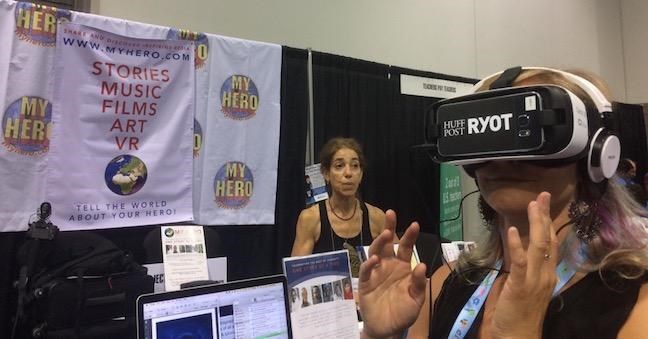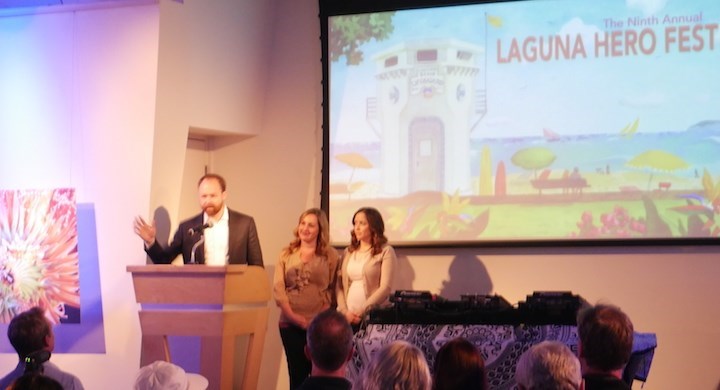 |
| RYOT's Zeda Stone and Bryn Mooser Photo credit: RYOT |
Bryn Mooser and David Darg are filmmakers who have perfected the art of showing the reality of many through the eyes of a few. Together, they built RYOT, an immersive media company that calls attention to key global issues by creating virtual reality and 360-degree experiences for their viewers. Their endeavor is more than a media company, it’s a continuation of lives lived in service.
Mooser was born in Venice Beach, California but spent his teen years in Zimbabwe, where his mother was a teacher. His sister was a volunteer at a local AIDS clinic and Mooser would help out from time to time. After studying anthropology and film at Vermont’s Bennington College, Mooser joined the Peace Corps to return to Zimbabwe. At the last minute, his mission was rerouted to the West African nation of The Gambia, the smallest country in mainland Africa.
 |
| MY HERO demonstrates RYOT VR as part of our VR for Good Program |
Living in a mud hut, with no electricity or running water, Mooser built a library and a school and worked on projects involving reforestation and agriculture. In the small community, he saw the importance and the power of the contributions each person made to the society.
When his time in The Gambia was over, Mooser returned to Venice Beach, to pursue a career in documentary filmmaking. However, when a devastating earthquake hit the country of Haiti in 2010, Mooser answered the rally cry for help. He joined Artists for Peace and Justice, a nonprofit organization that helped guide the efforts of celebrities who wanted to work on humanitarian projects in Haiti. There, Mooser met a man who would become his mentor, Father Rick Frechette. Mooser soon became the organization’s country director and helped Frechette build a secondary school.
In Zimbabwe, Mooser got to know David Darg, a freelancer who covered war and natural disasters for Reuters, CNN and the BCC. Darg also worked (and continues to work) with Operation Blessing International, a nonprofit humanitarian organization that provides disaster relief, medical aid, hunger relief, clean water, orphan care and community development in 37 countries.
Darg earned a Bachelor of Theology degree from Oxford University and holds a General National Vocational Qualification (GNVQ) certificate in sound engineering from Hereford Technology College. Like Mooser, Darg was a filmmaker.
In Haiti, the two started making films about humanitarian efforts to help spread awareness and garner support. One early effort, Sun City Picture House, included Mooser’s and David Darg’s own efforts to help a Haitian man build a movie theater for the people living in a tent city after the earthquake. The idea was to start the rebuilding of cinema culture among people who had lost their homes, their belongings and even family members. It was an effort to offer hope and inspire dreams and to give the community a dose of fun and culture after the horrific quake.
When the cholera outbreak hit Haiti nearly a year after the earthquake, Mooser and Darg co-directed and produced Baseball in the Time of Cholera, a short film that shows the devastation of the epidemic through the eyes of a young player on a Haitian baseball team. While focusing on the world of a teenage boy, the film tells a much larger tale of a humanitarian and environmental nightmare.
In 2012, with the help of a third partner, Martha Rogers, Mooser and Darg founded RYOT Films and continued producing documentaries as well as creating 360-degree and virtual reality stories. The word Ryot means Indian peasant or tenant farmer. That year, both Mooser and Darg were named among Esquire’s Magazine’s ‘Americans of the Year.'
In a 2014 Forbes article, Mooser told the reporter that, to him, the word “Ryot symbolizes the belief that we must all rise up together and support each other through consistent (and often difficult) work to create a better future. He quotes Martin Luther King, saying, “A riot is the language of the unheard.”
 |
| RYOT's Zeda Stone addresses the audience at the 2016 Laguna Hero Fest |
In January 2016, the RYOT team received an Academy Award nomination for the documentary short, Body Team 12, a film about the group of Liberians who had the job of removing bodies during an Ebola outbreak to prevent the spread of the disease. The film was honored at the Tribeca Film Festival, the Palm Springs International Film Festival, The Austin Film Festival and the Mountain Film Festival in Telluride, CO.
In April The MY HERO Project honored RYOT.org for using its virtual reality programs to contribute to the community, especially for their work with pediatric patients at Children’s Hospital of Orange County (CHOC). Zeda Stone, RYOT’s Head of Business Development, accepted the award at the Laguna Hero Fest.
Also that month, RYOT was acquired by the Huffington Post. The Huff Post website now features stories from RYOT Studios that the news organization hopes will generate a greater understanding of the world’s significant issues by allowing people to become more immersed in the stories using this new technology. Each RYOT story suggests ways viewers can take action and make a positive difference. By highlighting issues, and showing people how to get involved, the The RYOT team is helping to shape the way we view our world and interact with its people.
Page created on 8/6/2016 2:56:16 PM
Last edited 11/14/2018 10:38:24 PM




